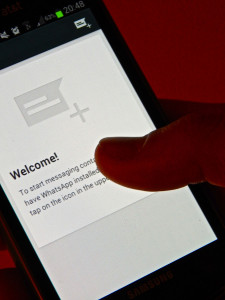“WhatsApp” brings co-founder from rags to riches
April 1, 2014
It is not that often that creating an app will bring someone from rags to riches. However, the co-founder of WhatsApp, Jan Koum, did just that. As a boy, Koum grew up in Ukraine and eventually immigrated to the United States where he and his mother settled in San Francisco, California. He grew up poor, and he and his mother lived on food stamps.
After meeting a friend and eventually a co-founder Brian Acton, who was rejected a job by both Facebook and Twitter, they created their app, WhatsApp. Facebook was astonished by the idea. They were bought out for $19 billion and Koum attained a position on the social networks board of directors. That’s when Koum knew that his life would be changed forever.
Koum’s father died in 1997 before he and his mother immigrated to the United States. In 2000, his mother died of cancer and he was left all alone. He did not know what to do, but then Acton helped out.

Whatsapp is designed to work across nearly all mobile platforms, and provides very low cost messaging and now calling for millions of people. The company was purchased for $4 billion cash and about $15 billion worth of stock.
“He credits Acton with reaching out and offering support. The two went skiing and played soccer and ultimate Frisbee,” Forbes reporter Parmy Olson wrote.
Although Koum had a hard time in school, he taught himself about computer networking and eventually joined woowoo, a hacking group. He went off to college where he was working as an internet security tester.
“He enrolled at San Jose State University and moonlighted at Ernst & Young as a security tester. In 1997, he found himself sitting across a desk from Acton, Yahoo employee 44, to inspect the company’s advertising system,” Olson wrote.
After getting help and ideas from his Russian friend Alex Fishman, he decided that his app was ready to go. In 2009, Koum launched his app on his birthday, but it still had many flaws that would need to be figured out and fixed.
“Early WhatsApp kept crashing or getting stuck, and when Fishman installed it on his phone, only a handful of the hundreds of numbers in his address book, mostly local Russian friends, had also downloaded it,” explained Olson.
Once the app went viral, all of the major companies wanted to buy it from Koum, but one company stood out to him.
“He was pounded daily by investors who wanted a piece of his company, WhatsApp. Koum looked at the email sender: Mark Zuckerberg. Now that was a first. The Facebook founder had been using WhatsApp and wanted him over for dinner. Koum stalled, then finally wrote back saying he was traveling soon and dealing with server issues. Zuckerberg suggested they meet before Koum left,” Olson wrote.
After meeting with Zuckerberg, they settled a deal that would leave them both pleased. Koum received $19 billion, and in return Zuckerberg got to have the app he had been long awaiting.
“So began the most lucrative two-year courtship in technology history, one in which admiration led to friendship and then, in a last-minute hurry, to an unprecedented transfer of wealth, all signed and sealed on the door of the welfare office Koum once haunted. Facebook bought WhatsApp for $4 billion in cash, $12 billion in stock, 8.5 percent of the company, plus $3 billion in restricted shares,” Olson explained.
The small-yet-large company plans to take WhatsApp to a whole new level of communications.
“The numbers are crazy for a company with only 56 employees and roughly $20 million in revenue, but it made sense for Facebook. WhatsApp, which does not even have a sign on the door of its headquarters in Mountain View, is one of the world’s most commonly used communication utilities after email and the telephone and will introduce voice calling later this year,” Olson wrote.
Since its breakthrough, WhatsApp has cut back billions of dollars nationwide on cell phone messaging plans.
“Its 470 million users have already erased $33 billion in SMS revenue from wireless carriers that got rich and fat charging per text. WhatsApp charges nothing for the first year and then asks you to pay $1 a year thereafter. No ads, no stickers, no premium upgrades,” Olson explained.
Koum and Acton changed their lives around with one simple little idea. By saving money for others and working the same, if not better, than any other messaging app. All that they had to do is get it to spread throughout the world and take over messaging.







Dan Strand • Apr 1, 2014 at 10:52 pm
Nice job covering a great rags to riches story. I liked the solid background story and the exact dollar figures added great detail to the story. Good use of quotes from a reliable source.